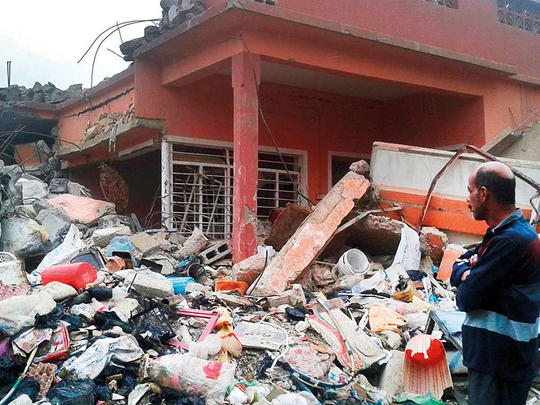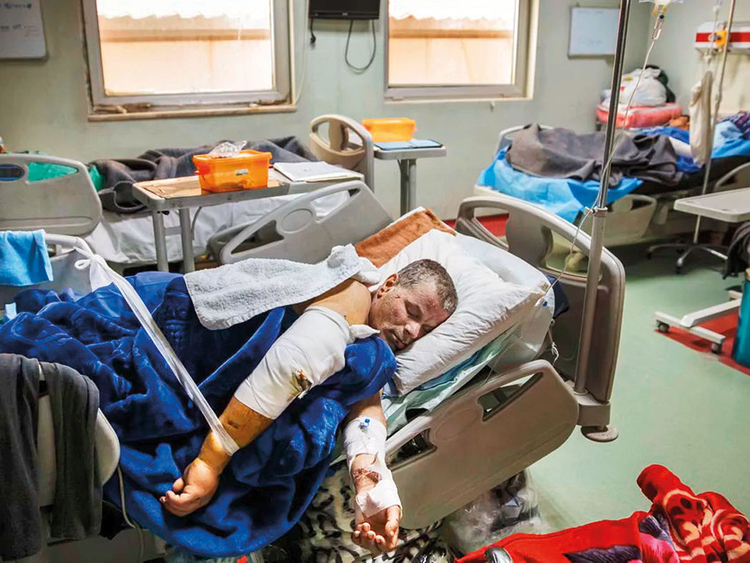
MOSUL, Iraq: When Ali Thanoon lost more than 50 members of his family in a US air strike during the battle against Daesh in Mosul in the spring, he turned to the Iraqi government for compensation.
But officials required Thanoon to prove his loved ones had been killed: He could get the necessary death certificates only by digging up their bodies from a mass grave.
That would take time. Thanoon had been trapped for five days under the rubble, then hospitalised for weeks. By the time a cousin was able to take Iraqi officials to unearth Thanoon’s two wives, seven children and other relatives, all they found were “meat and bones”, Thanoon said.
“What’s this?” said one of the officials. “We need to see faces.”
But there was another hard fact: The Iraqi government’s compensation programme for victims of the Mosul campaign, even those with death certificates, had no money.
For any hope of compensation for his losses, the 50-year-old shop owner would have to turn to the United States, which since the beginning of the war in Iraq has provided millions of dollars in “condolence” payments to families of civilians inadvertently killed by US air strikes or other unforeseen consequences of combat.
The US acknowledges that it has killed at least 801 civilians in Iraq and Syria since the campaign began in 2014. Independent monitors insist the toll is much higher: at least 5,975, according to the London-based monitoring group Airwars.
Congress has set aside at least $5 million through the end of 2018 for payments to civilians under the condolence programme. But a review of Pentagon data shows that just three such payments have been offered to families in Iraq over the last three years — and none was offered in Syria.
In the highest-profile incident of civilian casualties during the current campaign, a devastating strike that hit Thanoon’s neighbourhood of Jadidah in west Mosul on March 17, more than 100 lives were lost, making it one of the deadliest civilian casualty incidents in modern American military history.
Yet a survey of the neighbourhood by the Los Angeles Times last month found almost no one who had been visited by a US investigator or offered compensation. Thanoon said he wasn’t even aware that a US programme was available.
“No one came to see us,” Thanoon said. “Where do we go? We don’t know.”
A US military investigation found that the strike in Thanoon’s densely populated neighbourhood, which targeted two Daesh snipers, mistakenly killed at least 105 civilians. Residents and volunteers who responded to the scene initially said they retrieved 278 bodies; Thanoon’s family now puts the death toll at 155.
Eric Pahon, a Pentagon spokesman, said the condolence programme has been difficult to administer with few US ground troops in the region. Areas controlled by Daesh have in many cases been impossible to access, he said.
The US has made condolence payments in various countries, including Afghanistan and Iraq, where commanders initially paid claims from a fund created out of the millions of dollars confiscated from Saddam Hussain’s Baath Party. Payments are based on the severity of injury, type of damage, what is considered culturally appropriate and prevailing economic conditions. To qualify, civilians must be deemed “friendly” to the US and their losses cannot have been caused by enemy operations. Each payment goes to the head of household and is not considered an admission of wrongdoing.
The US generally paid a maximum of $2,500 per death in a given household.
Mohammed Fadhil lost his wife of 19 years and three other family members on March 17. He spent months digging up bodies and obtaining death certificates to apply for compensation from the Iraqi government. But when he arrived at a courthouse to submit the completed claim recently, it was so crowded he gave up.
The taxi driver dreams of building a new home on a piece of land he owns outside Mosul, but he can’t afford it: He makes less than $10 a day.
For now, he and his three children are staying at a friend’s house near the remains of their former home. They have no plans to return.
“I had a good life there,” Fadhil said, “and now it is gone.”
Thanoon had two homes in the area and operated two businesses, a clothing store and a dairy — all damaged or destroyed in the fighting. His savings — about $4,000 in cash and gold jewellery — disappeared in the air strike that killed his family as they sheltered at a neighbour’s house.
On a recent morning, he slumped on a neighbour’s front step as two labourers chipped at chunks of concrete recovered from one of his razed homes to shape them into blocks. It’s the only building material he can afford, he said.
Haunted by memories, Thanoon has started drinking for the first time in six years. Lying awake in the narrow bed set up for him in a corner of his brother’s living room, he can see his dead wives and children gathered on the sofas.
It was in this room that the family heard the news on television, months before the fateful air strike, that the long-anticipated battle to free Mosul had begun.
“We were laughing and dancing, we were so happy,” Thanoon said, his voice breaking.
He has thought about remarrying, but wonders how he would support a new family. He suffers chronic pain, and after nine surgeries, he is still missing 75 per cent function in his right arm, which rests in a sling.
“Sometimes I think about becoming a suicide bomber and going straight to God,” he said, cradling his injured arm. “All roads are closed to me. I can’t do anything.”













